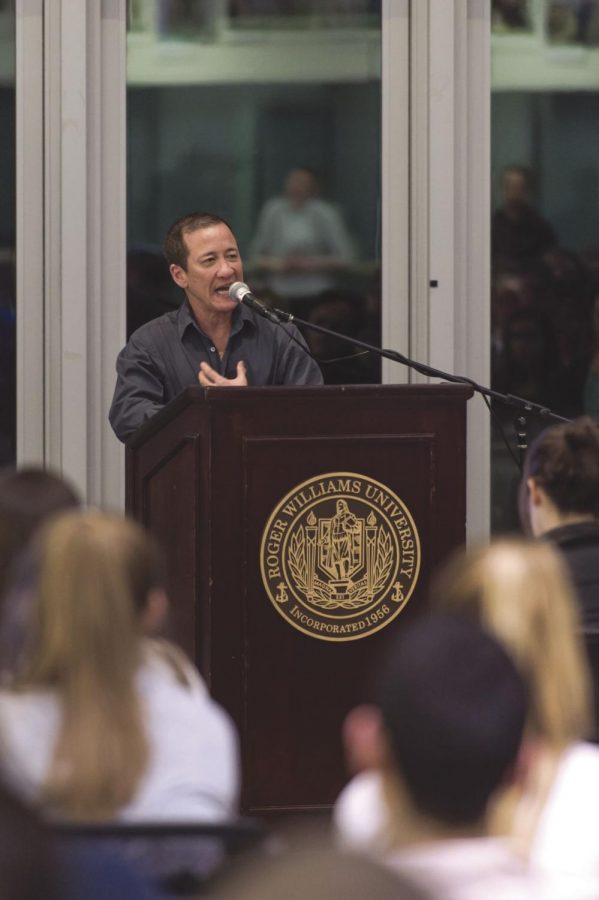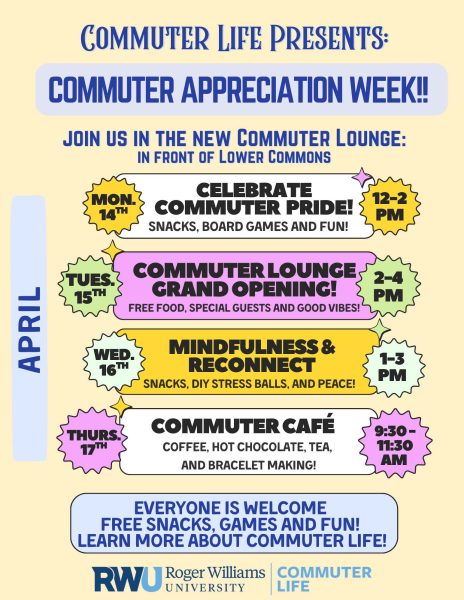Transformational resistance: a conversation on Transgender rights
Rebecca Farias
Herald Reporter
Willy Wilkinson, an award-winning transgender activist, author, and public health consultant, visited Roger Williams University on the evening of Thursday, Feb. 16 to deliver an address in which he reinforced the importance of transgender and social justice activism.
“What are all these chairs doing here? I thought there were going to be, like, 12 people,” Wilkinson, the keynote speaker of the night, joked to his eager audience before launching into his address titled “Transformational Resistance with an Intersectional Lens.”
In reference to the national mood, Wilkinson smiled and commented, “It’s an interesting time, isn’t it?” He was referring to recent attacks on immigrant and LGBTQ+ rights, adding that they are “all interconnected.” However, in the theme of resistance, he invited the audience to take action by texting “Here to Stay” to 877877. In doing so, they could learn how to support immigrants and refugees threatened by current policies.
Wilkinson then plunged into an assessment of Title IX, a 1972 law which protects people from bias in educational or government-sponsored contexts. While the provision was originally applied to protect female students and, later, gay and lesbian individuals, in 2014 the Obama administration affirmed that Title IX law also applies to the trans community.
However, civil rights groups worry that Betsy DeVos, the newly appointed Secretary of Education, will gut the provisions of Title IX. These concerns stem from the public’s knowledge of her personal belief that education should remain in state and local control.
“I don’t think she’s ever set foot in a school,” Wilkinson said, laughing.
The conversation quickly sobered as he discussed the everyday difficulties faced by trans people in manifesting their basic rights. They are often reduced to the public’s basic conceptualizations of gender and the human body, resulting in the infamous bathroom debate. Conditions are often no better than “separate but equal,” argues Wilkinson, on the basis of nonexistent “bathroom violence.”
Wilkinson cited a 2016 study, in which 59 percent of the 28,000 trans people surveyed felt too afraid to simply use a public restroom. Wilkinson urged his audience to resist the potential discarding of Title IX, and encouraged them to call Secretary DeVos at 202-401-3000 to remind her of this law’s importance.
Wilkinson also spoke on “Life Beyond My Body: Transgender Journey to Manhood in China,” the first known memoir written by an openly trans Chinese man named Lei Ming. Ming’s work sheds light on issues of diversity and gender on a global scale and, particularly, issues that are commonly neglected in Western-centric conversations. Ming’s heartbreaking struggles with using the bathroom in public and his difficulties securing identification documents, both of which are faced by most trans people, are amplified by the fact that in China, the majority of restrooms are crowded, open spaces, and a train ride often requires an identification document.
Gender reassignment surgery is even more cost-prohibitive in other places than it is in the United States. Wilkinson drew parallels to his own life as a “racially nonconforming trans kid” who changed his name at the age of nine. Teachers and family misgendered him, and people judged him for his half-white, half-Asian appearance. He drew hope from the feminist movement during college, coming out as a female lesbian. In the midst of a rising nonbinary movement of the mid-90s, he came out as transgender, married a woman, and eventually became a father of three. Wilkinson has also published several works, including a memoir entitled “Born On the Edge of Race and Gender: A Voice For Cultural Competency.”
Challenging his audience to respect their uniqueness and question their campus’s dedication to protecting transgender rights, Wilkinson reminded every student, faculty, and staff sitting in the audience that transgender rights are universal human rights, and that every person deserves to express their authentic self.
Closing with a reading of his poem “Divine,” Wilkinson recited: “Trans beauty is us, it’s you and it’s they. Keep being yourself; you are the divine.”





